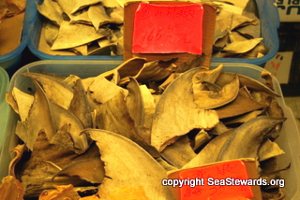To help protect sharks, Bay Area Assemblymen Paul Fong and Jared Huffman have introduced a new bill to increase protections for sharks. This bill, AB 376, seeks to reduce the demand for shark fins by targeting the market for fins in California. Himself an Asian Pacific American, Mr. Fong grew up in Hong Kong consuming shark fin soup. After he learned of the effect it is having on the shark population, he stopped eating it. In this effort, Mr. Fong is joined by Chinese-American chefs, scientists, fishermen and conservationists in a coalition to stop the sale of shark fins in the state. Although we have laws against killing sharks solely for their fins, shark fins are imported from Ecuador, Costa Rica, Hong Kong and other countries. The shark fin sales ban will help protect sharks worldwide.
As top predators, sharks are the architects of ocean ecosystems, yet even as we are trying to study our local sharks with the California Academy of Sciences, we are losing sharks to fisheries offshore. Up to 73 million sharks are killed annually for their fins, with some shark populations declining by as much as 90 percent as a result. In fact DNA sequenced from fins purchased in San Francisco indicate that the fins come from sharks all over the world, over half threatened as Vulnerable by the International Union for Conservation of Nature (IUCN). One unrecognizable bag of noodles purchased was once a Great Hammerhead Shark, a species that can grow up to 18 feet and weigh 1500 pounds. Hammerheads sharks are highly coveted for soup and it has been well established that the finning industry targets these species. Perhaps 3 % of this shark made it to market if the animal was finned.
State Senator Leland Yee, who is running for mayor of San Francisco, called AB 376 an "attack on Asian culture." However a groundswell of supporters of AB 376 are Chinese, including some of the bill’s Sponsors, a group called the Asian Pacific American Ocean Harmony Alliance. Since the announcement, an overwhelming response has come from our local Asian community, primarily in support of the bill.
Agreeing that shark finning is wrong but calling a ban on sales extreme, Mr. Yee stated that some sharks are well populated and many can and should be sustainably fished. While there are some shark fisheries, most have collapsed after any intensive effort, and others have fewer and smaller sharks. He calls for measures already in place by the Shark Conservation Act, and to test fins at the ports: an expensive and time intensive process that is impracticable for our customs authorities. These are not viable alternatives. Due to their reproductive biology, which includes late onset of maturity, few young and long gestation periods, sharks cannot be farmed and do not stand up to a focused fishery. Fully one third of all shark species are on the IUCN Red List. Thirty are endangered and populations are decreasing for most others.
Fishing a shark population to provide fins and even meat cannot supply the world or even local demand for shark fin soup. In the 1950's, Soupfin sharks in the San Francisco Bay were fished to a state of commercial and ecological collapse. Sixty years later, this population may have just recovered from that fishery. In fact, to this day we don’t know how many Soupfin sharks live in the Bay This is not an issue of race or culture. This is an ecological imperative. Cultures evolve just as our methods of harvesting the sea must evolve. With 80% of the world’s fisheries in collapse, and sharks threatened with extinction at the current rate of fishing, we need to take drastic measures now.
Our common culture is the Ocean, a culture of all races, and the health of the oceans and fisheries are our common resource. The current market for shark fin is unsustainable and AB 376 will help reduce that demand and restore ecosystem health. San Francisco’s Ocean Culture must lead this charge for ocean health and for sharks.
37.7699 -122.467174
 The growing demand for shark fin soup is helping to drive rampant illegal shark finning in international waters and the California market is contributing to this problem.
The growing demand for shark fin soup is helping to drive rampant illegal shark finning in international waters and the California market is contributing to this problem.